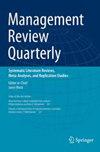Information overload research in accounting: a systematic review of the literature
IF 9
Q1 Business, Management and Accounting
引用次数: 0
Abstract
Abstract This paper reviews literature in the domain of information overload in accounting. The underlying psychological concepts of information load (as applied in accounting research) are summarized, and a framework to discuss findings in a structured way is proposed. This framework serves to make causes, consequences, and countermeasures transparent. Variables are further clustered into major categories from information processing research: input, process, and output. The main variables investigated are the characteristics of the information set, especially the number of information cues as an input variable; the experience of the decision-maker, the decision time, decision rule, and cue usage as process variables; and measures related to decision quality (i.e., accuracy, consensus, consistency) and related to selfinsight (calibration, confidence, feeling of overload) as output variables. The contexts of the respective research papers are described, and the operationalization of variables detailed and compared. We employ the method of stylized facts to evaluate the strength of the links between variables (number of links, direction and significance of relationship). The findings can be summarized as follows: most articles focus on individual decision-making in the domain of external accounting, with financial distress predictions constituting a large part of these. Most papers focus on input and output variables with the underlying information processing receiving less attention. The effects observed are dependent on the type of information input and the task employed. Decision accuracy is likely to decrease once information load passes a certain threshold, while decision time and a feeling of overload increase with increasing information load. While experience increases decision accuracy, the results on decision time and consensus are conflicting. Most articles have not established a significant link between changes in information load and changes in decision confidence. Relative cue usage, consensus, consistency, and calibration decline with increasing information load. Available time has a rather positive effect on decision accuracy and consensus. Based on these findings, implications for practice and future research are derived.会计信息超载研究:文献综述
摘要本文综述了会计信息超载领域的相关文献。总结了信息负荷的潜在心理学概念(如在会计研究中的应用),并提出了一个框架,以结构化的方式讨论研究结果。这个框架的作用是使原因、后果和对策透明化。从信息处理研究中,变量进一步聚集成主要类别:输入、过程和输出。研究的主要变量是信息集的特征,特别是作为输入变量的信息线索的数量;决策者的经验、决策时间、决策规则和线索使用作为过程变量;与决策质量(即准确性,共识,一致性)和与自我洞察力(校准,信心,过载感觉)相关的措施作为输出变量。描述了各自研究论文的背景,并对变量的操作化进行了详细的比较。我们采用程式化事实的方法来评估变量之间联系的强度(联系的数量,关系的方向和重要性)。研究结果可以概括如下:大多数文章关注外部会计领域的个人决策,财务困境预测构成了其中的很大一部分。大多数论文关注的是输入和输出变量,而对底层信息处理的关注较少。观察到的效果取决于输入信息的类型和所使用的任务。当信息负荷超过一定阈值时,决策准确率有可能下降,而决策时间和过载感则随着信息负荷的增加而增加。虽然经验提高了决策的准确性,但决策时间和共识的结果是相互矛盾的。大多数文章没有建立信息负荷变化和决策信心变化之间的重要联系。相对线索的使用、一致性、一致性和校准随着信息负荷的增加而下降。可用时间对决策的准确性和一致性有相当积极的影响。基于这些发现,我们得出了对实践和未来研究的启示。
本文章由计算机程序翻译,如有差异,请以英文原文为准。
求助全文
约1分钟内获得全文
求助全文
来源期刊

Management Review Quarterly
Business, Management and Accounting-Business, Management and Accounting (miscellaneous)
CiteScore
12.90
自引率
0.00%
发文量
52
期刊介绍:
Management Review Quarterly (MRQ) is a double-blind, peer-reviewed academic journal that specializes in systematic narrative literature reviews, bibliographic studies, meta-analyses, and replication studies. The journal’s scope covers all fields of business and management research including both new and established ones. MRQ’s aim is to summarize and categorize knowledge in management and business research, aggregate important empirical research findings, and challenge existing knowledge through rigorous replication studies. The journal’s goal is to contribute to the empirical grounding of business and management studies as academic disciplines and is of high interest not only for academic readers but also for practitioners interested in evidence-based management and/or evidence-based policy making. MRQ was founded in 1951 at the Hochschule für Welthandel in Vienna, Austria (now WU Vienna University of Economics and Business) as a German language journal under the title ''Journal für Betriebswirtschaft (JfB)''. This makes MRQ one of the oldest research based business and management journals internationally.
 求助内容:
求助内容: 应助结果提醒方式:
应助结果提醒方式:


